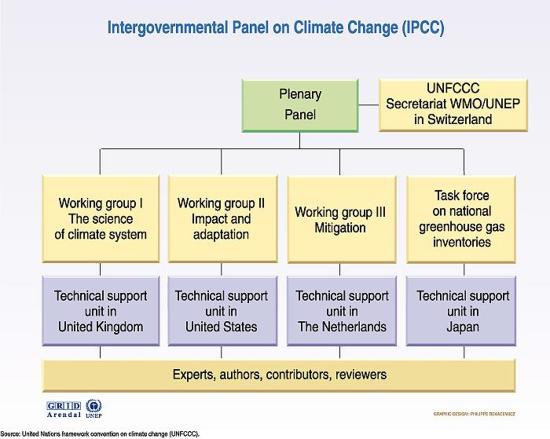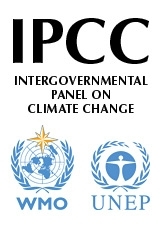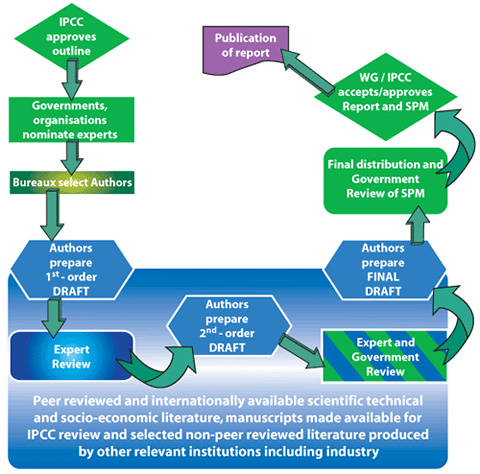Intergovernmental Panel on Climate Change
Contents
Intergovernmental Panel on Climate Change (IPCC)
The Intergovernmental Panel on Climate Change (IPCC) is an international organization with a mandate "to assess on a comprehensive, objective, open and transparent basis the best available scientific, technical and socio-economic information on climate change from around the world."
The IPCC has issued four multi-volume Assessments (1990, 1995, 2001, and 2007) addressing scientific, technical and socio-economic information about climate change. The IPCC Fourth Assessment Report was released on November 17, 2007. The Report asserts that "[t]he assessments are based on information contained in peer-reviewed literature and, where appropriately documented, in industry literature and traditional practices. They draw on the work of hundreds of experts from all regions of the world. IPCC reports seek to ensure a balanced reporting of existing viewpoints and to be policy-relevant but not policy-prescriptive." In addition, IPCC has issued many Special Reports, Methodology Reports and Technical Papers and other products.
The IPCC is current beginning work on its Fifth Assessment Report, which is expected to be finalized in 2014.
Because of the scale and international scope of participation in creating IPCC Assessments, they have received considerable attention from governments, the media and other interested parties and have had significant influence on discussions about international treaties and laws at all levels of government. IPCC Assessments have also been the subject of criticism, particularly from those who doubt the reality or importance of human impact on global climate, or are concerned about actions proposed to address the issue. Criticism has been leveled at both the substance of assessments and the processes by which they are produced. Despite criticism, IPCC Assessments and reports are generally regarded among scientists studying climate change as accurate summaries of the state of knowledge on the topic.
Formation and Operation

The IPCC was established in 1988 by two branches of the United Nations, the World Meteorological Organization (WMO) and the United Nations Environment Programme (UNEP). Membership in the IPCC is open to members of WMO and UNEP. About once a year the IPCC member nations send representatives to a plenary meeting, where major decisions are made about IPCC's mission, activities, finances, leadership, and adoption of reports.
More regular leadership of the organization is provided by an "IPCC Bureau," a group of 30 people, including the IPCC Chair and the Co-Chairs of IPCC Working Groups and Task Force. The current IPCC Chair is Rajendra K. Pachauri. IPCC Vice Chairs are Richard Odingo, Mohan Munasinghe, and Yuri A. Izrael.
The IPCC carries out it work through three Working Groups and a Task Force:
- Working Group I (Intergovernmental Panel on Climate Change (IPCC)) assesses the scientific aspects of the climate system and climate change. Co-Chairs: Dahe Qin and Susan Solomon.
- IPCC Working Group II assesses the vulnerability of socio-economic and natural systems to climate change, negative and positive consequences of climate change, and options for adapting to it. Co-Chairs: Osvaldo Canziani and Martin L. Parry.
- IPCC Working Group III assesses options for limiting greenhouse gas emissions and otherwise mitigating climate change. Co-Chairs: Ogunlade Davidson and Bert Metz.
- The Task Force on National Greenhouse Gas Inventories is responsible for the IPCC National Greenhouse Gas Inventories Programme. Co-Chairs: Thelma Krug and Taka Hiraishi.
These groups recruit and assign lead authors, contributing authors and reviewers for specific chapters of reports.
Management of IPCC is carried out by a Secretariat, which is hosted by the WMO in Geneva, Switzerland and supported by UNEP and WMO. In addition, each of the four groups has a technical support unit located at a research center supported by a government of a participating nation. These are located in Boulder, USA; Exeter, United Kingdom; Bilthoven, the Netherlands; and Hayama, Japan.
The decision to prepare a report is made by the full IPCC in plenary session. Often a “scoping” meeting or an expert workshop is held to outline what the report will address, with policymakers and others consulted to ensure that all key policy-relevant issues are identified. For each report a specific Working Group or Task Force is assigned responsibility to overseeing the work that will produce the report. Experts that might serve as authors, reviewers or editors are nominated by governments and participating organizations. The Working Group or Task Force then selects Coordinating Authors and Lead Authors for specific chapters of the report. Contributing Authors also assist specific aspects of a chapter.
It is IPCC policy that "authors work on the basis of peer reviewed and internationally available literature, including manuscripts that can be made available for IPCC review and selected non-peer reviewed literature. Source, quality and validity of non-peer reviewed literature, such as private sector information need to be critically assessed by the authors and copies have to be made available to reviewers who request them. Disparate views for which there is significant scientific or technical support should be clearly identified in IPCC reports, together with relevant arguments. Expert meetings and workshops may be used to support the preparation of a report."
As shown in Figure 2, IPCC reports go through three formal drafts and reviews. First an expert review, second a government/expert review, and finally a government review of the draft Summary for Policymakers. The Summary for Policymakers goes through a line-by-line review and approval process by the relevant Working Group or Task Force. Finally, each IPCC report is reviewed by the the full IPCC before approval and publication, usually in the six official languages of the United Nations.

